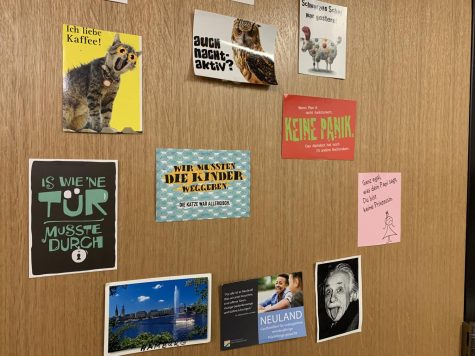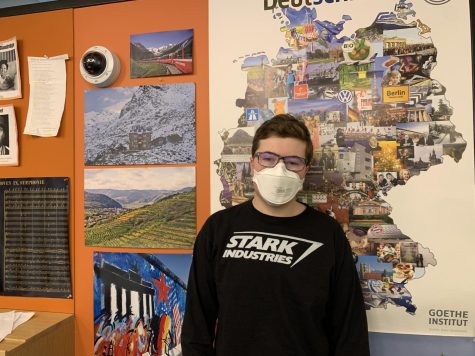The Language Learning Process: Ep.4 German
In this episode, sophomore Clara McKoy peeks into the German language learning process by interviewing Upper School German teacher Rachel Ruddick and sophomore Andrew Drake. Ruddick shares her fascinating story of learning German as a child and now becoming a German teacher while Drake talks about possibly studying abroad in Germany in his future years. (Made via Canva)
Ruddick: [Speaking in German]
Drake: [Speaking in German]
McKoy: [Introduction] Welcome to the German Language Podcast. I’m your host, Clara McKoy. Today we’ll be hearing from teacher Rachel Ruddick and sophomore Andrew Drake.
Ruddick: My name is Rachel Ruddick, and I have she/her pronouns.
Drake: I’m Andrew, I’m he/him.
Ruddick: This is my first year at this school. So I’m teaching all of the four levels of German, which means there’s a lot of preparation work to do. However, I’ve really enjoyed getting to know the kids.
Drake: I’m a sophomore, and I’ve been doing German for five years and I’m in German three.
McKoy: How do you think German differs from other languages?
Ruddick: I think there are two main things about German: one, it’s typically less accessible to the students than, for example, Spanish, which you often will come across in your everyday life. You often see things translated in Spanish at the supermarket, or on products, or everywhere you call. Whereas German you don’t see as much in your everyday life. People typically don’t know that many songs in German or movies in German. However, there is a really strong German influence that some people may be more aware of than others, but there were many German immigrants to the US that had that left their mark in many Midwestern states, and it’s affected American culture and the language in several different ways.
Drake: I feel like it’s kind of I learned it because I thought it was kind of like cool sounding. I didn’t really know much about it. But I just think Germany is really cool country. It has lots of different ethnicities. It has lots of different cultures and cool places there.

McKoy: So, what are your favorite techniques or like activities that you use in class to help students learn?
Ruddick: I like trying to make classroom activities as active as possible and get kids to really use the language, either in conversations or role plays, or sometimes we play games. And I also like trying to bring in more authentic resources or interview someone from a German-speaking country and ask them certain questions we’re currently doing a virtual exchange project with a school in Germany that actually the middle school teacher set up, but we are exchanging videos and also currently the project is a Kahoot challenge where our students come up with trivia questions about their local region. And then the German students are going to come up with questions about their region and so we get to know each other in that way, and through these activities, I hope that the language becomes more alive. That it’s a real language that real people speak.
Drake: In middle school, it was a lot of games and a lot of fun little things to get you really interested in the language. But as we progress into high school, it’s been a lot more like answer questions with partners and there’re still games and that makes it fun. But we’ve been focusing a lot more on grammar recently, which I think is good to become fluent, but it can always be a little bit boring.
McKoy: How long have you taught German?
Ruddick: This is my first year teaching German at a school. I have experience as a summer camp counselor teaching Waldsee at Concordia or teaching German at Waldsee, which is one of the Concordia Language Villages. But previously, my experience was more in a German-speaking country teaching English.
McKoy: Oh, interesting. What countries?
Ruddick: I’ve been living in Austria for the past five years. And before that, I lived in Germany for one year. And then, often in the summers, I would teach at an English summer camp in Switzerland.
McKoy: How do you plan to use your knowledge of German in the future and you kind of already touched on this, but why did you choose to take the German course at SPA in the first place?
Drake: I chose German, it was kind of a weird choice, but I chose it because I was just listening to how the language sound sounded, and out of all the other languages, I thought it sounded kind of cool. I was like, “Ooh, I could sound like that if I learned it.”
McKoy: What is your favorite and least favorite thing about German as a language?
Drake: I like the language because some of the words can be really funny and it’s also very literal. There’s lots of words that actually like just mean straightforward things like the light bulb is a glowing pear. And a slug is a naked snail. Some things I don’t like about German are grammar, which is with all languages, and articles can get kind of excessive and really hard to understand.

McKoy: And then circling back to what you said about like job opportunities in Germany, do you plan on someday moving there or tell me more about that?
Drake: Um, probably more traveling. It’s pretty difficult to move to a whole different country, but it is definitely an idea. I might want to do like maybe study abroad for a year in college, or something similar to that.
McKoy: Do you plan on continuing studying German for the rest of high school and beyond?
Drake: Probably the rest of high school. A lot of colleges I’m looking into don’t really have a huge German program, but if they do, I probably will take it just because it’s really cool to know another language. And German is really fun to learn.
McKoy: What drew you to German? Like, is it your first language?
Ruddick: No. Um, I was drawn to German through my parents because my mom has German ancestors. Her mother was German and her father was American. So my mom was actually born in Germany. And then, she moved with her family to the US when she was around three. So she grew up mostly speaking English. Although German was technically her first language. She grew up then in the US, and when she had children, she tried speaking German to us when we were growing up, but it was kind of too difficult. So what she ended up doing instead was sending us to German language classes on the weekend, or on Monday nights. So I started when I was young to take Monday evening German classes. And then, I also attended the camp that I worked at later, Concordia Language Villages.
McKoy: What do you think are the biggest challenges and rewards in teaching German?
Ruddick: One of the biggest challenges for me is to teach something that fits each individual student or that meets each student where they’re at and allows them to develop because sometimes you have mixed levels in the classroom or mixed interests and I, I hope that there’s something for everyone that maybe some kids aren’t interested in a certain topic that we’re going over, but hopefully I do something different a couple of weeks later that they’re more engaged. So I even though every person is different, I try to offer something for everyone. It’s really fun to see kids progress. I especially enjoy watching the beginning levels come from knowing nothing to being able to be used German to express themselves and it’s, it’s fun to see how far they’ve come and see how they develop in their language skills.
Drake: I think everyone should be, try and like learn a little bit of German just and get to know German people. It’s really fun. And just give it a chance. It’s a really fun class to take.
McKoy: [Outro] Thank you for listening. Once again, I’m Clara McKoy, and this has been the Langauge Learning Podcast.
My name is Clara McKoy (she/her). I’m the director of The Rubicon Online. At school, I’m involved in Community Action and Service Club and Senior...
My name is Rita Li (she/her) I work as Creative Design Manager for The Rubicon online. At school, I’m involved in tennis, ping pong club, and ASA. I...